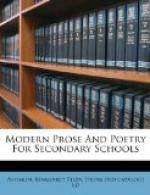=pastoral ditty=:—A poem about shepherds and the happy outdoor life. The word pastoral comes from the Latin pastor, shepherd.
=Syracusan times=:—Syracuse was an important city in Sicily. See the note on Sicilians, above.
=Trinacrian hills=:—Trinacria is an old name for Sicily.
=bulls and bears=:—A bull, on the Stock Exchange, is one who operates in expectation of a rise in stocks; a bear is a person who sells stocks in expectation of a fall in the market.
=Jauncey Court=:—The Jauncey family were prominent in the early New York days. This court was probably named after them.
=AEgon=:—Usually spelled AEgaeon; another name for Briareus, a monster with a hundred arms.
=Daphnis=:—In Greek myth, a shepherd who loved music.
=Nais=:—In Greek myth, a happy young girl, a nymph.
=Cyclops=:—One of a race of giants having but one eye—in the middle of the forehead. These giants helped Vulcan at his forge under Aetna.
=Galatea=:—A sea-nymph beloved by the Cyclops Polyphemus.
=Silenus=:—The foster-father and companion of Bacchus, god of wine. In pictures and sculpture Silenus is usually represented as intoxicated.
=Fauns=:—Fabled beings, half goat and half man.
=Arethusan water=:—Arethusa, in Greek myth, was a wood-nymph, who was pursued by the river Alpheus. She was changed into a fountain, and ran under the sea to Sicily, where she rose near the city of Syracuse. Shelley has a poem on Arethusa.
=baton=:—A rod or wand; here, of course, a policeman’s club.
SUGGESTIONS FOR STUDY
The author sees an organ-grinder playing his gay tunes in Wall Street, New York, among the buildings where enormous financial transactions are carried on. He (the author) imagines this wandering minstrel to be Pan himself, assuming a modern form. Read the notes carefully for what is said about Pan. Notice, in the poem, how skillfully the author brings out the contrast between the easy-going days of ancient Greece and the busy, rushing times of modern America. Of what value is the word serenely in the first stanza? What is the “curbstone war”? Do you think the old-fashioned Pan’s pipe is common now? Could a man play an organ and a pipe at the same time? Why is the city spoken of as “sordid”? What is the “civic ear”? In the description of the player, how is the idea of his being Pan emphasized? How was it that the bulls and bears drew together? In plain words who were the people whom the author describes under Greek names? Show how aptly the mythological characters are fitted to modern persons. Read carefully what is said about the power of music, in the stanza beginning “O heart of Nature.” Who was the man in blue? Why did he interfere? Why is the organ-grinder called a “vagrant demigod”? What was it that the author doubted? What is meant here by “Great Pan is dead”? Does the author mean more than the mere words seem to express? Do you think that people are any happier in these commercial times than they were in ancient Greece? After you have studied the poem and mastered all the references, read the poem through, thinking of its meaning and its lively measure.




